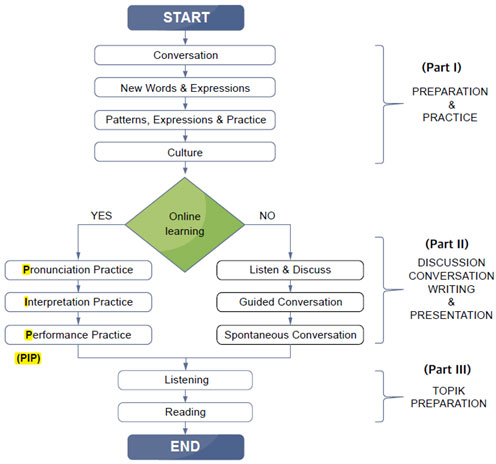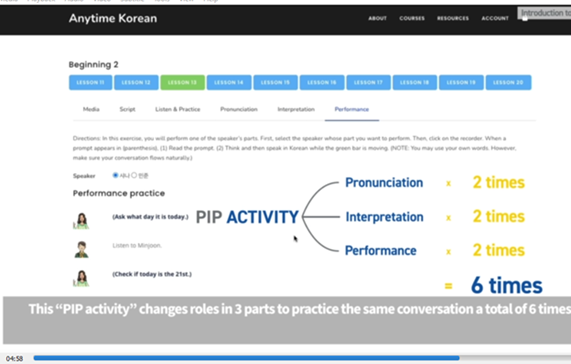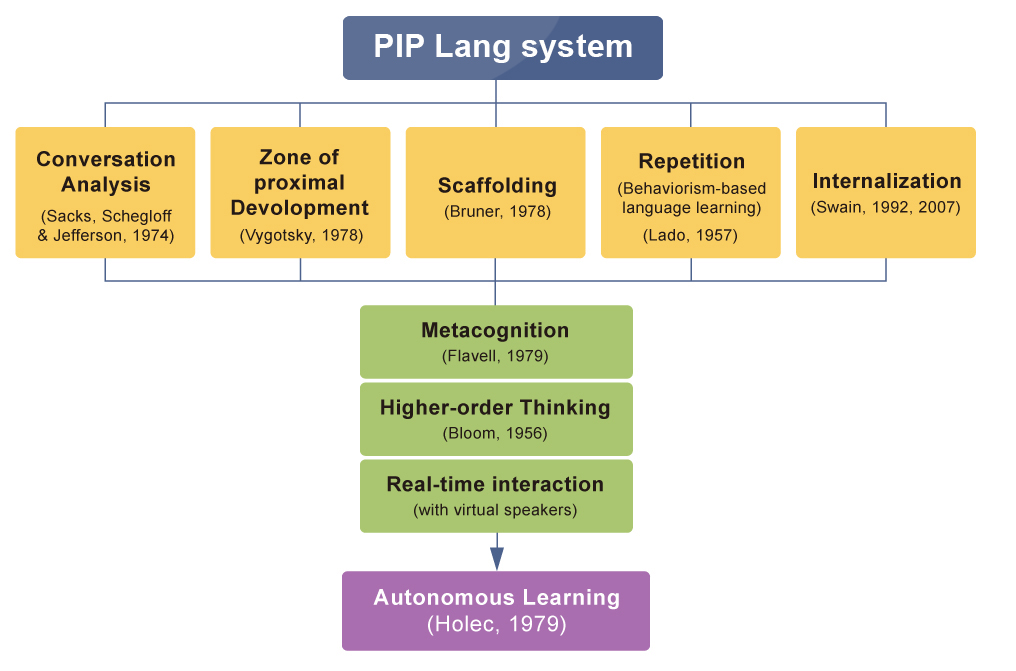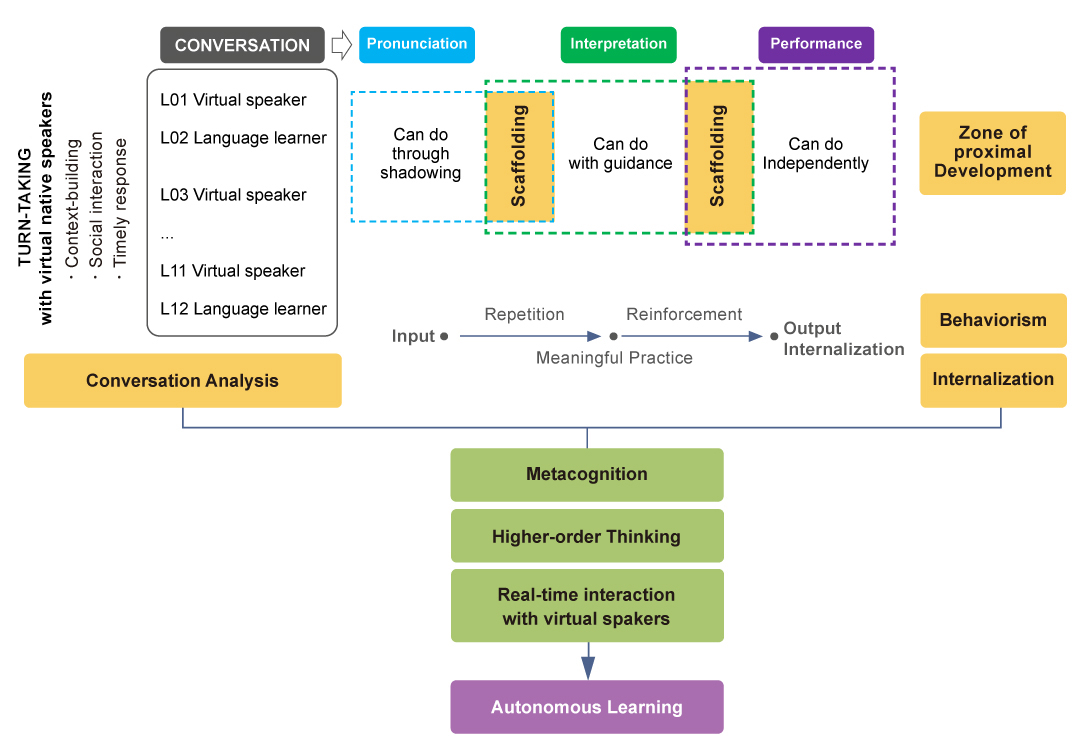PIP Lang
PIP Lang (Pronunciation, Interpretation, Performance), developed in cooperation with the Department of Asian Languages and Civilizations at the University of Colorado Boulder, aims to provide learners with real-time interaction with virtual Korean speakers in conversation.
1. How was PIP Lang born?
1.1 ISSUE: In a large-size language classroom, learners have few opportunities in the whole academic term to practice speaking with their teacher (the only Korean speaker in the classroom) and receive feedback.
1.2 SOLUTION: With PIP Lang, learners can practice speaking with virtual Korean speakers (alternative to their teacher) anytime and anywhere, in unlimited times.
While practicing conversation with PIP Lang, learners can record their own conversation in the system and submit it to their teacher's PIP Lang account as a speaking assignment to receive feedback.
(Note: Teachers can create online speaking assignments in their virtual classroom at AnytimeKorean.com where learners practice speaking with virtual Korean speakers, record it, and submit it to their teacher.)
1.3 After completing Listen & Discuss, Guided Conversation, or Spontaneous Conversation in the Anytime Korean textbook series, learners can most benefit from PIP Lang activities. (See below.)

2. What do learners do in PIP (Pronunciation, Interpretation, and Performance)?
In each activity, learners practice speaking according to the context of a conversation, alternating the roles of speaker and listener with a Korean speaker one-on-one (1:1). Moreover, when the conversation is completed, not only can learners listen to their recordings, but they can also submit them as assignments to their teacher's PIP Lang account.
2.1 Pronunciation
Learners can focus on their pronunciation along with practicing target grammar points and expressions in the full context of a conversation. They practice in the pattern of listening, thinking, and shadowing in a timely manner.
2.2 Interpretation
Learners can focus on the meaning of Korean sentences along with practicing pronunciation and target grammar points in the full context of a conversation.
Interpretation is a spiral-up process that requires learners to create sentences in the target language beyond accurate pronunciation. Learners practice in the pattern of reading, thinking, and speaking in a timely manner.
2.3 Performance
Learners can focus on how they should respond to Korean speakers (speech acts) in the target language along with practicing pronunciation, target grammar points, and target expressions in the full context of a conversation.
Performance is another spiral-up process that requires learners to create the target language without any help that is available at the stage of Pronunciation and Interpretation. In Performance, learners practice in the pattern of understanding, thinking, and speaking in a timely manner.
PIP Lang changes the speakers' roles in three activity types (Pronunciation, Interpretation, Performance) to practice a full set of the same conversation a total of six times so that learners can successfully internalize conversation ability.
 Because PIP Lang activities are designed to require learners to respond to virtual Korean speakers in a timely manner, they help learners practice speaking close to natural conversation.
Because PIP Lang activities are designed to require learners to respond to virtual Korean speakers in a timely manner, they help learners practice speaking close to natural conversation.
3. What theories are PIP Lang based on?
 Using PIP Lang, teachers can facilitate learners’ autonomous and ubiquitous learning.
Using PIP Lang, teachers can facilitate learners’ autonomous and ubiquitous learning.
4. Where are the theories applied in the PIP Lang system?
 PIP Lang provides gaming environments for learners so that they can feel challenged in a conversation because they are required to interact with virtual speakers in a timely manner, with cognitive reinforcement, and under higher-order thinking.
PIP Lang provides gaming environments for learners so that they can feel challenged in a conversation because they are required to interact with virtual speakers in a timely manner, with cognitive reinforcement, and under higher-order thinking.
5. Conference and Workshop Presentations
Kim, T. & Kim, S. “Teachers’ Perceptions of Using Virtual Conversation Partners (PIP Lang) in Asynchronous Class during the Pandemic.” American Association of Teachers of Korean (AATK) annual conference & workshop, Conell University, June 2022.
PIP Lang (2022-yr pilot study).pdf
Kim, S. & others. “Facilitating Deeper Learning in Online Language Courses within the Community of Inquiry Framework.” 26th American Association of Teachers of Korean (AATK) conference, June, 2021.
Kim, S. & Kim, T. “I had so much trouble before, but now it’s easier”: Students’ Perceptions and Learner Autonomy through Asynchronous KFL Online Course.” 25th American Association of Teachers of Korean (AATK) conference, Columbia University, June, 2020.
PIP LANG (2019 Pilot Study).pdf
Kim, S. and others. “Development of Korean materials in online and app formats.” The 28th International Conference on Korean Language Education, Kyung Hee University (Seoul), July, 2018.
Kim, S. & Baik, J. “The Use of a Virtual Speaker in Online Language Courses as an Alternative to a Human Speaker.” 23rd American Association of Teachers of Korean (AATK) conference, University of Toronto, June, 2018.
Kim, S. and others. “'Planning and designing online Korean courses: Cases from five universities in North America” 22th American Association of Teachers of Korean (AATK) conference, University of Southern California, June, 2017.
Kim, S. & Min, Hoki. “The virtual speaking activities: Can they be off-line activities?” 21th American Association of Teachers of Korean (AATK) conference, Emory University, June, 2016.
Kim, S & Lee, Eunhee. “The Use of the Virtual Speaker and Adapted Textbook Conversations for Effective Teaching of Speaking.” 18th American Association of Teachers of Korean (AATK) conference, Michigan State University, June, 2013.
Kim, S & Azimova, Nigora. “Online Assessment.” Language Technology Share Fair, University of Colorado at Boulder, April 19, 2013. Kim, S. & Min, Hoki. “Introducing Interactive Virtual Conversation Partners to KFL learners on the Web.” 17th American Association of Teachers of Korean (AATK) conference, Stanford University, June, 2012.
Kim, S. “Using the Web for Conversational Practice.” South Central Association for Language Learning Technology (SOCALLT), April, 2012.